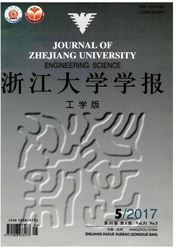

 中文摘要:
中文摘要:
为了考察胺类有机物在氯盐环境中的阻锈能力,采用动电位极化测量、电化学阻抗谱法(EIS)和弱极化法,结合氯离子浓度、阻锈剂浓度、溶液pH值3个影响因素,研究胺类有机物———胍在有氯盐存在的模拟混凝土孔隙液中对钢筋锈蚀行为的影响和对已锈蚀钢筋的延缓作用.试验研究表明:在模拟混凝土孔隙液的pH值为12.50,且溶液中胍的浓度与氯离子浓度相近时,胍可在钢筋表面形成保护被膜,有效地阻止和延缓了钢筋锈蚀的发生,显著降低了已锈蚀钢筋的锈蚀速率,甚至使其停止锈蚀.在相同浓度下,当模拟混凝土孔隙液的pH值从12.50降至10.50时,胍的阻锈能力下降,表明胍在氯盐环境中有较好的阻锈能力.
 英文摘要:
英文摘要:
Amines and alkanolamines are the basic components of corrosion inhibitors for electrochemical injection.This work experimentally investigated the effectiveness of an amine-based inhibitor,guanidine,in preventing the chloride-induced corrosion of carbon steel or halting the corrosion process of precorroded steel in chloride-contaminated simulated concrete pore solutions.Considering the pH value of the solution,guanidine concentration and chloride ion concentration,the corrosion behaviors of steel in different solutions were studied by means of electrochemical potentiodynamic polarization test,weak polarization method,electrochemical impedance spectroscopy(EIS).The results indicated that,in term of pH=12.50,when the concentration ratio of guanidine and Cl-was close to 1.0,guanidine could form a protective film on the surface of carbon steel,thus effectively delayed the start of corrosion and reduced the corrosion rate of precorroded steel,even halted the corrosion process.When the pH value fell to 10.50,compared with the result of pH=12.50,the effectiveness of guanidine descended.Hence amines-based inhibitor,guanidine can be an effective corrosion inhibitor for electrochemical injection in chloride-polluted concrete.
 同期刊论文项目
同期刊论文项目
 同项目期刊论文
同项目期刊论文
 期刊信息
期刊信息
